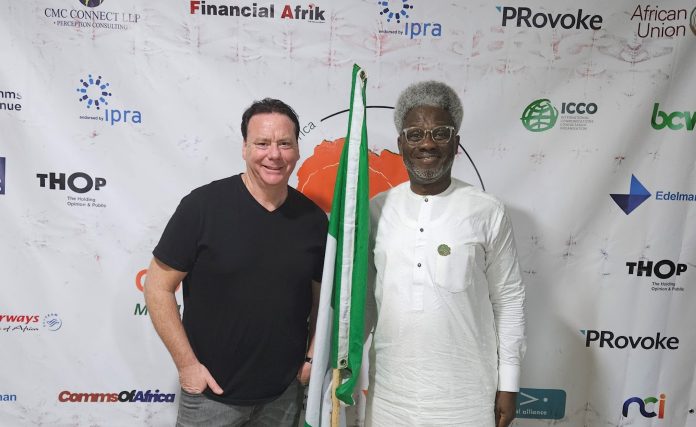The Head Media Relations at the Nigerian Communications Commission (NCC), Dr. Omoniyi Ibietan, has just been elected the Secretary-General of the African Public Relations Association (APRA) at the ongoing 35th Annual Conference and Annual General Meeting (AGM) taking place in Abidjan, Côte d’Ivoire.
Ibietan was elected into a three-man Executive Council. The other two members are Arik Karani (Kenya), President, and Dr. Michele Mekeme (Cameroon), Vice President.
Ibietan, a fellow of the Nigerian Institute of Public Relations (NIPR) and APRA, has promised to work with other members of the Executive Council to continue the trajectory of reforms in APRA, expand the democratic space by encouraging greater participation of national public relations institutions on the continent.
He has also expressed his readiness and commitment to working more closely with the African Union Commission and Council of Ministers to put public relations at the heart of policy, programmes, and project implementation.
Ibietan, a journalist, writer, and author works at NCC where he oversees aspects of the public communication strategy of the national regulatory authority for telecommunication in Nigeria.
Earlier in Nigeria’s Fourth Republic, he was Special Media Advisor to the Federal Minister of Information and Communication. He has over 20 years of experience in media and communication scholarship and practice, spanning journalism, academia, policy discourse, communication strategy, regulation, and stakeholder relations.
Ibietan earned BA and MA in Communication Arts and Communication & Language Arts from the Universities of Uyo and Ibadan in Nigeria, respectively, graduating atop his classes. Earlier, he obtained a diploma in journalism with distinction from the Moscow-Based International Institute of Journalism.
He holds a Ph.D. in Communication from the North-West University in South Africa, with specialisation in political communication. He is a IP3 certified regulation specialist and holds a mini MBA in telecommunications from NEOTELIS in Paris.
He is also a member of the African Council for Communication Education (ACCE), an Associate Registered Practitioner of Advertising (arpa) and member of the International Institute of Communications (IIC), the world’s only policy debating platform for the converged communications industry.
As a scholar, he focuses on patterns of political communication through new media; media and culture studies; and theoretical & normative foundations of communication in relation to democracy and freedom. He is on the faculty of the Nigerian campus of Italy-based Rome Business School (RBS), where he teaches doctoral students PR & Advertising and Media Management & Communication Strategy. He also facilitates learning to students in the Master of Corporate Communication programme at RBS.
His first book, Social Media, Social Demography, and Voting Behaviour in Nigeria, was published by Premium Times Books in Washington in May 2023. He has travelled extensively in Africa, North America, Europe, and Asia.
At the ongoing conference, Ibietan presented the first paper at the commencement of business sessions titled: Digital Inclusion as Arbiter of Accessible Public Relations: A case of Nigerian Communications Commission.
Using Castells’ Theory of the Network Society and the Knowledge Gap Theory, and based on the actions of the Nigerian government through the activities of the Nigerian Communications Commission (NCC), Ibietan advanced a thesis that digital inclusion is the arbiter of digital public relations.
Through implementation of laws, policies, guidelines, developmental regulation, collaborative partnerships, social investments, operational efficiency and ancillary actions that are consequential and quantifiable, and using copious pictorial evidence, Ibietan discoursed a perspective that NCC’s digital inclusion programmes, projects and activities are foundational to digital economy.
He argued that this is because investment in and coordination of expansion of digital infrastructure, demonstrating their affordances and enhancing people’s access to such resources, constitute the building blocks and raison d’être of digital economy and inherently digital public relations.
APRA, the successor to the Federation of African Public Relations Association (FAPRA), instituted in Nairobi in 1975, exists to foster unity of Africans and their global allies through interactions and exchange of meaning. This year’s theme is ‘One Africa, One Voice: Bridging Africa’s Communication Divide’.
APRA Côte d’Ivoire 2024 is endorsed by the Government of Côte d’Ivoire, the Holding Opinion & Public (THOP), and major global PR associations, namely the International Public Relations Association (IPRA), The International Communications Consultancy Organisation (ICCO), the Global Alliance for Public Relations and Communication Management (GA), the African Union Commission (AUC), and PR national associations across the continent.
Additionally, the conference featured the eight edition of the Innovation Summit (IN2SUMMIT) and included the seventh edition of the SABRE Awards Africa, holding tonight. The APRA secretariat is in Nigeria, and the body maintains an observer status with the African Union.




